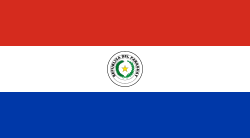Salvador Jovellanos
| Salvador Silvester del Rosario Jovellanos Guanes | |
|---|---|
| 5th President of Paraguay | |
|
In office December 18, 1871 – November 25, 1874 | |
| Preceded by | Cirilo Antonio Rivarola |
| Succeeded by | Juan Bautista Gill |
| Personal details | |
| Born |
December 31, 1833 Asunción |
| Died |
February 11, 1881 (aged 47) Buenos Aires Argentina |
| Nationality | Paraguayan |
| Political party | Colorado |
Salvador Silvester del Rosario Jovellanos Guanes (1833–1881) was Paraguayan politician.
He served as Vice President from 1870 to 1871 and President from December 18, 1871 – November 25, 1874. His main concern as president was Paraguay’s slow recovery from Paraguay’s humiliating defeat in its war with Brazil, Argentina and Uruguay.
His life
Silvestre Salvador del Rosario Guanes Jovellanos was born in Asuncion on December 31, 1833. He was still very young when his family left the country in time of Don Carlos Antonio López to settle in Buenos Aires, where he formed his own family.
Political participation
He was listed as one of the members of the Paraguayan Association, when it began on December 28, 1858. He signed the act of the assembly on March 1, 1865 and April 24 of that year adopted the document which asked the Argentine government the authorization to realize the projected Paraguayan Legion. He joined that association with Otoniel Peña, being accepted as a partner in the meeting of the steering committee held on January 18, 1865.
The return
In mid-January 1869, when there is news that Asuncion was invaded by allied forces, Jovellanos returns to Paraguay, at the age of thirty-six, along with Juan B. Gill, Jose Decoud, Juan Antonio Jara, Carlos Loizaga, Benigno Ferreira, Cayo Miltos and other citizens who were considered "expatriates".
On January 25, 1869, and in the capital, signed the petition addressed to the allied forces, which ensured the creation of a temporary government with Paraguayan citizens. On March 25, 1870 was on the payroll of directors of the Grand People's Club, governed by Dr. Facundo Machaín. In elections for a constituent MP, which took place on July 3 that year, he was elected by the Cathedral district with a total of 302 votes.
He was part of the constitutional business commission in charge of drafting the Constitution and was also in another which was appointed for formulating a law of election, and another to discuss the powers of the standing committee. He died in Buenos Aires on February 11, 1881.
His government
After the death of Vice President Cayo Miltos, January 7, 1871, the Senate named him as such and, following the resignation of president Rivarola, assumed the presidency of the Republic between December 18, 1871 and November 25, 1874, and he inherits the chaotic situation created by the fall of Rivarola.
Previously accompanied in several situations to Don Cirilo Antonio, he served as minister of War and Navy, November 25, Minister of the Interior on April 12, 1871 and 15 in the same month and year, he was involved in the dissolution of Chambers and of the call for a new Congress. But later, he had to leave the vice presidency in the hands of Juan Bautista Gill and was launched to years of voluntary exile in Buenos Aires.
During his government, he signed the Treaty of Peace and Boundaries Loizaga – Cotegipe, with Brazil and Uruguay as well as other extradition, friendship, commerce and navigation (lost the vast territory between the rivers Apa and Blanco, in addition to the east of Amambay).
The peace treaty with Uruguay was signed. A new loan of 2,000,000 pounds was recruited in London, with the same or worse than the previous result of 1871, but only 124,000 pounds arrived to Paraguay, which neither was admitted to the tax coffers, but were taken by the authorities. This new debt was paid off in 1961.
The first line of trams was built, which crossed the main streets of the capital. This was leaving the port and climbed down the street until Colòn Street and Independencia Nacional, Palma and twice in Libertad Street, now called Eligio Ayala, and thus reached its endpoint which was the railway station.
Major works
Jovellanos patiently sought to reorganize the public administration. His government performed paving in some streets of Asuncion; created the Council of Public Instruction and the immigration office and the Economic and Management Boards in the interior and was established, moreover, the rules of the Police and the setting of the first general revenues.
One problem that Jovellanos faced during his government was the external relations containing other definitions preserved since the death of Don Carlos Antonio López and that remained outstanding in the postwar period of 70. An early setback which this government had to face was the occupation of Argentine troops in the West Village on January 29, 1872.
Political Biography
He participated in the National Constituent Convention of 1870. He served in the posts of Minister of War and Navy and Interior Minister. He was one of the founders of the Republican National Association (Colorado Party).
References
- Publications at the newspaper ABC Color.
| Political offices | ||
|---|---|---|
| Preceded by Cayo Miltos |
Vice President of Paraguay 1870–1871 |
Succeeded by Higinio Uriarte |
| Preceded by Cirilo Antonio Rivarola |
President of Paraguay 1871–1874 |
Succeeded by Juan Bautista Gill |

